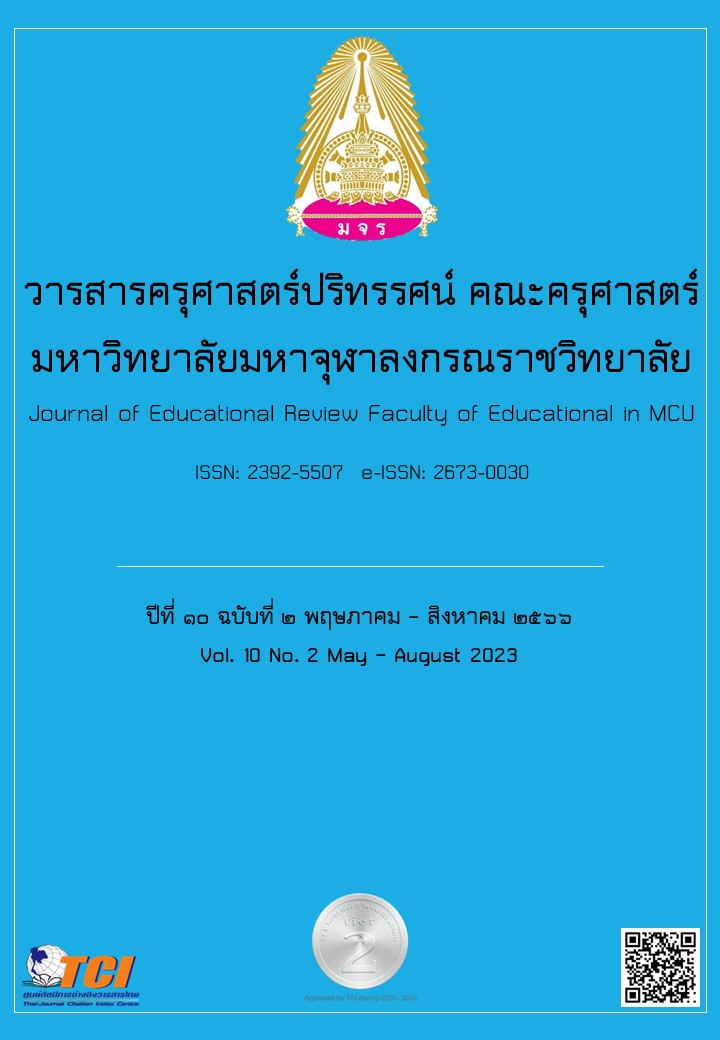THE PRINCIPLE OF ACQUIRING WISDOM THROUGH THE PRINCIPLES OF VUTHIDHAMMA
Main Article Content
Abstract
This academic article focus on the acquiring educational wisdom with the Vuthidhamma principle that will lead the practitioner to the growth of wisdom which consist of four aspects. 1) Sappurisanseva is knowing how to choose the source of knowledges, association with the learned persons, good person, enlightened and wisdom. 2) Saddhammasavana is being energetic in listening to lectures, advice and learning knowledge both directly from the person and book or the media as well as intend to research and ask to understand the real knowledge always. 3) Yonisomanasikara is the process of analytical thinking, examining the causes and effects in the right method by yourself and distinguishing the condition and investigating the reasons that what is that, how did this happen, why is that. 4) Dhammanudhammapatipatti is being able to utilize knowledge from learning, listening and thinking carefully and use for practice by the appropriate means. However, acquiring the wisdom is very important in the present because it is easier to find information from many channels. When the person has practiced according to the following principles, who is being able to acquire knowledge and well considered, will get wisdom and succeeds in achieving his desired objectives in order to the growth for self and others. Moreover, It is also the development of human resources in the country, which they have correct principles and drive the country towards achieving growth as well as live happily in society.
Article Details

This work is licensed under a Creative Commons Attribution-NonCommercial-NoDerivatives 4.0 International License.
ทัศนะและความคิดเห็นที่ปรากฏในบทความในวารสารฉบับนี้ถือเป็นความรับผิดชอบของผู้เขียนบทความนั้นเพียงผู้เดียว และไม่ถือเป็นทัศนะและความรับผิดชอบของกองบรรณาธิการ
กองบรรณาธิการขอสงวนสิทธิ์ในการคัดเลือกบทความลงตีพิมพ์และจะแจ้งให้เจ้าของบทความทราบหลังจากผู้ประเมินบทความตรวจอ่านบทความแล้ว
ต้นฉบับที่ได้รับการตีพิมพ์ในวารสารครุศาสตร์ปริทรรศน์ คณะครุศาสตร์ มหาวิทยาลัยมหาจุฬาลงกรณราชวิทยาลัย ถือเป็นกรรมสิทธิ์ของคณะครุศาสตร์ มหาวิทยาลัยมหาจุฬาลงกรณราชวิทยาลัย ห้ามนำข้อความทั้งหมดหรือบางส่วนไปพิมพ์ซ้ำ เว้นเสียแต่ว่าจะได้รับอนุญาตจากมหาวิทยาลัยฯ เป็นลายลักษณ์อักษร
References
ธีรวัฒน์ วงศ์แก้ว. (2554). การศึกษาคือปัจจัยที่ 5 ของชีวิต. แหล่งที่มา https://shorturl.asia/27NjY สืบค้นเมื่อ 24 ก.พ. 2565.
นันทพงศ์ ปุณขันธ์. (2552). ความหมายการศึกษา. แหล่งที่มา https://sites.google.com/site/nanthphngs/kar-suksa สืบค้นเมื่อ 24 ก.พ. 2565.
พระเทพดิลก (ระแบบ ฐิตญาโณ) (2534). อธิบายหลักธรรมตามหมวดจากนวโกวาท. กรุงเทพมหานคร: โรงพิมพ์ธรรมสภา.
พระเทพเวที (ประยุทธ์ ปยุตฺโต). (2535). พจนานุกรมพุทธศาสตร์. พิมพ์ครั้งที่ 7. กรุงเทพมหานคร: โรงพิมพ์มหาวิทยาลัยมหาจุฬาลงกรณราชวิทยาลัย.
พระธรรมปิฎก (ประยุทธ์ ปยุตโต). (2545). ชีวิตที่เป็นอยู่ดี ด้วยมีการศึกษาทั้ง 3 ที่ทำให้พัฒนาครบ 4. กรุงเทพมหานคร: ธรรมสภาและสถาบันบันลือธรรม.
พระพุทธโฆสเถระ. (2546). วิสุทธิมรรค. แปลโดย สมเด็จพระพุฒาจารย์ (อาจ อาสภมหาเถร). พิมพ์ครั้งที่ 4. กรุงเทพมหานคร: ประยูรวงศ์พริ้นติ้ง.
พระภาวนาวิริยคุณ (เผด็จ ทตฺตชีโว). (2550). ชีวิตนี้มีไว้ทุ่มเดิมพัน. กรุงเทพมหานคร: โรงพิมพ์รุ่งศิลป์การพิมพ์ (1977).
พระภาวนาวิริยคุณ (เผด็จ ทตฺตชีโว). (2553). ศาสตร์และศิลป์แห่งความเป็นครู. กรุงเทพมหานคร: กลุ่มงานโรงเรียนอาชีวศึกษา.
พระมหาอดิศร ถิรสีโล. (2545). คุณธรรมสำหรับครู. กรุงเทพมหานคร: โรงพิมพ์มหามกุฏราชวิทยาลัย.
มหาจุฬาลงกรณราชวิทยาลัย. (2539). พระไตรปิฎกภาษาไทยฉบับมหาจุฬาลงกรณราชวิทยาลัย.กรุงเทพมหานคร: โรงพิมพ์มหาจุฬาลงกรณราชวิทยาลัย.
ศิริชัย กาญจนวาสี. (2553). วิธีแสวงหาความรู้/ความจริงของมนุษย์. แหล่งที่มา https://shorturl.asia/ufGQS สืบค้นเมื่อ 24 ก.พ. 2565.
สมบูรณ์ ศาลาชีวิน. (2526). จิตวิทยาเพื่อการศึกษาผู้ใหญ่. เชียงใหม่: ลานนาการพิมพ์.
สุชาติ สุขราช. (2530). ทฤษฎีการเรียนรู้ 8 ขั้น ของกาเย่. แหล่งที่มา https://www.gotoknow.org/posts/514954 สืบค้นเมื่อ 24 ก.พ. 2565.
สุรพล ไกรสราวุฒิ. (2552). คู่มือปัญญาในพระพุทธศาสนา. กรุงเทพมหานคร: ธรรมสถาน
Carter Victor Good. (1973). Dictionary of education. 3d ed. New York: McGraw-Hill.
Gagne, R. (1970). The conditions of learning. Aguilar. Madrid.
John Dewey. (1910). "What is thought?" Chapter 1 in How we think. Lexington, Mass: D.C. Heath.
Mutchnick, R. J., & Berg, B. L. (1996). Research Methods for the Social Sciences: Practice and Applications. Boston, MA: Allyn and Bacon.


